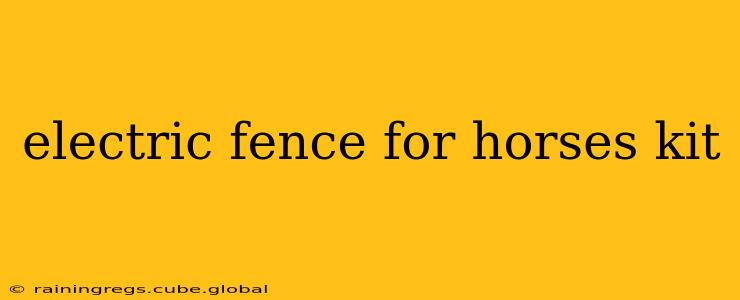Choosing the right electric fence for your horses is crucial for their safety and well-being. A well-maintained electric fence provides a safe and effective boundary, preventing escapes and protecting your horses from potential hazards. This guide explores electric fence kits for horses, covering everything from choosing the right kit to installation and maintenance.
What's Included in a Typical Electric Fence Kit for Horses?
A basic electric fence kit for horses usually includes the following components:
- Energizer: This is the heart of the system, providing the electrical pulse that deters horses from crossing the fence. The power of the energizer is measured in joules (J) – higher joules generally mean a stronger pulse, necessary for larger pastures or areas with more vegetation.
- Wire or Tape: Electric fence wire or tape conducts the electric pulse. Tape is often preferred for horses due to its greater visibility. The width and material of the tape will impact its effectiveness and longevity.
- Fence Posts: These support the wire or tape, maintaining the fence's height and tension. Posts come in various materials, including wood, metal, and fiberglass. Consider the terrain and longevity when choosing your posts.
- Insulators: These attach the wire or tape to the posts, preventing current leakage to the ground. Good quality insulators are essential for maintaining a strong electric pulse.
- Grounding Rod(s): This crucial component helps to complete the electrical circuit and ensures a strong, consistent shock. The number of grounding rods needed depends on soil conditions and the size of your pasture.
What Size Energizer Do I Need for My Horse Fence?
The size of the energizer you need depends on several factors:
- Size of the pasture: Larger pastures require more powerful energizers to maintain a consistent shock across the entire fence line.
- Type of fencing: Tape generally requires a less powerful energizer than wire, due to its lower resistance.
- Vegetation: Heavy vegetation can significantly reduce the effectiveness of an electric fence, necessitating a more powerful energizer.
- Soil conditions: Dry, sandy soil offers less grounding than moist, clay soil. This can impact the effectiveness of the energizer and may require additional grounding rods.
How Do I Install an Electric Horse Fence Kit?
Installing an electric horse fence is a relatively straightforward process, but proper installation is key to its effectiveness. Here's a step-by-step guide:
- Plan your fence line: Determine the perimeter of your pasture and the location of gates.
- Install the posts: Ensure posts are spaced appropriately (typically every 8-10 feet). Properly driven posts are crucial for fence stability and integrity.
- Attach the insulators: Secure the insulators to the posts, ensuring they're firmly in place.
- String the wire or tape: Maintain proper tension to ensure effective conductivity.
- Connect the energizer: Connect the wire or tape to the energizer, following the manufacturer's instructions.
- Connect the grounding rod(s): Properly ground the system using appropriate grounding rods to ensure a safe and effective shock.
- Test the fence: Use a fence tester to verify the fence is properly energized. Regular testing is essential for maintaining fence effectiveness.
How Often Should I Test My Electric Fence?
Regular testing is crucial for ensuring the safety and effectiveness of your horse's electric fence. Ideally, you should test your fence at least once a week, especially after storms or periods of heavy vegetation growth. A simple fence tester will quickly identify any breaks in the circuit.
What are the Different Types of Electric Fence for Horses?
There's a range of electric fence options available, each with its own advantages and disadvantages:
- Polywire: A strong and durable option but can be less visible to horses than tape.
- Polytape: Highly visible and easy to install, offering better conductivity than wire. Comes in various widths, with wider tape generally being more visible.
- High-tensile wire: Offers excellent durability and conductivity, but requires stronger posts and more precise installation.
The choice of fencing will depend on your budget, pasture conditions, and personal preferences.
Can I Use a Solar Energizer for My Horse Fence?
Solar energizers are a viable option, particularly for smaller pastures or areas with limited access to electricity. However, their power output can be less consistent than mains-powered energizers, so carefully consider the size of your pasture and vegetation before choosing a solar option.
This guide provides a comprehensive overview of electric fence kits for horses. Remember, safety is paramount. Always follow the manufacturer's instructions carefully and conduct regular maintenance to ensure your horse's safety and well-being.
